





















































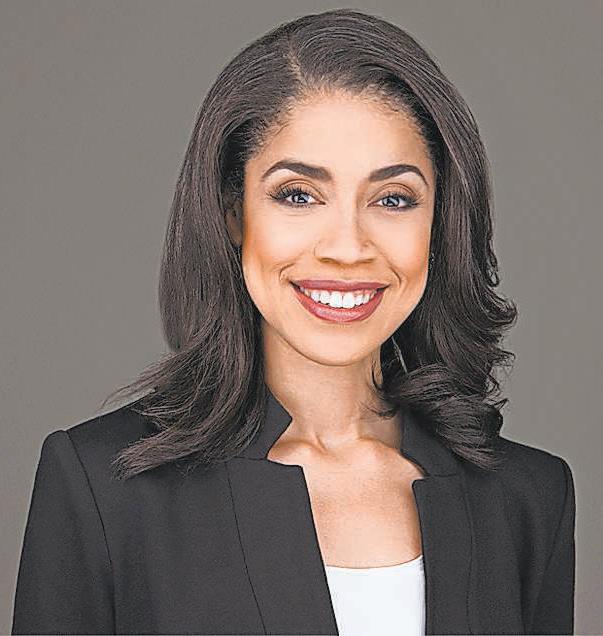
18th Congressional District seat candidates line up
When I heard that Christian Menefee was stepping down as Harris County Attorney to run for the late Congressman Sylvester Turner’s seat, my first thought was: Who else is running? It wasn’t long before Amanda Edwards also threw her hat in the ring. (Edwards ran against Turner for the seat this past November).
I’ve been wondering who would step up to fill this role, and while I respect both Menefee’s and Edward’s leadership, I can’t help but hope for more young, vibrant candidates to enter the race. We need fresh faces with new ideas—people who understand the urgency of this moment and have the grit to fight for real change.

Texas’ 18th Congressional District has been hit hard with loss. In less than a year, we’ve lost not one but two sitting members of Congress. Sheila Jackson Lee, who held this seat for nearly three decades, passed away last July. Just two months into succeeding her, Turner—who had already left an indelible mark as Houston’s mayor—died suddenly in March. That’s a heavy blow for the nearly 800,000 people across downtown, Acres Homes, Third Ward, and beyond who relied on their leadership.


Turner’s legacy is undeniable, but legacies shouldn’t just be preserved—they should inspire the next wave of leadership.
When I first heard Captain America star Anthony Mackie’s comments about raising his sons to be “real men,” I braced myself for the backlash. Anytime a Black man talks about masculinity in today’s climate, people get defensive. But honestly? I understood exactly where he was coming from.
In an recent interview on The Pivot podcast, Mackie expressed concerns over diminishing traditional male roles and his commitment to raising his sons as “young men” who embody respect and responsibility.
Mackie wasn’t attacking anyone—he was simply speaking on what it means to him to be a present, intentional father. And as someone who values structure, discipline, I respect that.
Teaching his sons to say “yes sir, no ma’am,” to open doors, to take care of their mother— those aren’t outdated ideals. That’s instilling pride, accountability, and responsibility in young Black boys in a world that often tries to strip them of it.
Yes, masculinity has evolved, and yes, we should allow space for people to define it in their own ways. Society constantly tells Black men they’re either too soft or too aggressive—too weak or too threatening. It’s exhausting.
Losing music Icons: Angie Stone, Dwayne Wiggins, Roberta Flack
The recent deaths of music icons, Dwayne Wiggins, Roberta Flack, and Angie Stone feels like losing pieces of my own life’s soundtrack. These aren’t just artists; they’re the voices that carried us through heartbreak, love, joy, and every complicated feeling in between.
Dwayne Wiggins, with Tony! Toni! Toné!, gave us music that felt like family cookouts, first loves, and Sunday rides with the windows down. His guitar work and production shaped R&B in ways we still benefit from today. It’s hard to imagine that sound without him.
Roberta Flack gave us R&B, soul, and ballads. From The Closer I get to you to Killing Me Softly, she’s had the ability to strip a song down to its rawest form and still make it feel rich and full.
And Angie Stone? She made us feel soul music in a way that wasn’t flashy but deeply felt. Songs like No More Rain and I Wanna Thank you always gave me nostalgic vibes.
We’re watching generational talent slip away, and it hurts. In this popcorn generation its hard to get young folks to understand the magnitude of “old school” musicians like them.
ON THE WEB
• Dr. James Douglas: Houston-area elder shares wisdom gems to empower.
• The Houston Arts Alliance appoints Taylor Jackson as its new CEO.
• Terrance’s Take: Violent baton attack at Virginia State Track Meet.
By Tannistha Sinha
District D Council member Carolyn Evans-Shabazz is dealing with a persistent issue in her district—illegal dumping. The problem exists when someone dumps waste, such as household trash, construction debris, old appliances, and hazardous materials, on public and personal property without permission.

District ofcials say it is a major contributor to the degradation of the district’s environment.
To tackle the problem, Evans-Shabazz said the district has its own HOT team, comprising four people, two trucks and two trailers.
She recommended her constituents to call 311 to report incidents and ask to be transferred to District D with their service request number for a faster response to complaints. She also advised residents to “safely” take a photo of a license plate if they notice a car dumping trash in a neighborhood.
“I want somebody to be made an example of,” Evans-Shabazz said, adding illegal dumping makes up a signifcant portion of all waste produced in the Tird Ward, Sunnyside, and South Park. “Unfortunately, a lot of times, they don’t even live in the community, or they’re within blocks of their own home…a lot of times they are dumping that material on that road that leads to the legal dumping [site].”
Illegal dumping can result in citation charges or misdemeanors, which could result in fnes of up to $10,000 for ofenders.
Shamika Martin, a contractor for the state of Texas and resident of District D, said that in underserved communities in District D, where many families struggle to pay rent, utilities, child care and medication, combating illegal dumping is not one of their priorities, suggesting council members focus on community-based resources instead.
“We need to fnd a diferent mechanism in order to report illegal dumping,” Martin said. “Simply prosecuting someone in an underserving community where there is little to no resources is not a better solution.”
Martin said the Solid Waste department is “overworked and underappreciated,” and is understafed to address the city’s demands. She suggested creating a
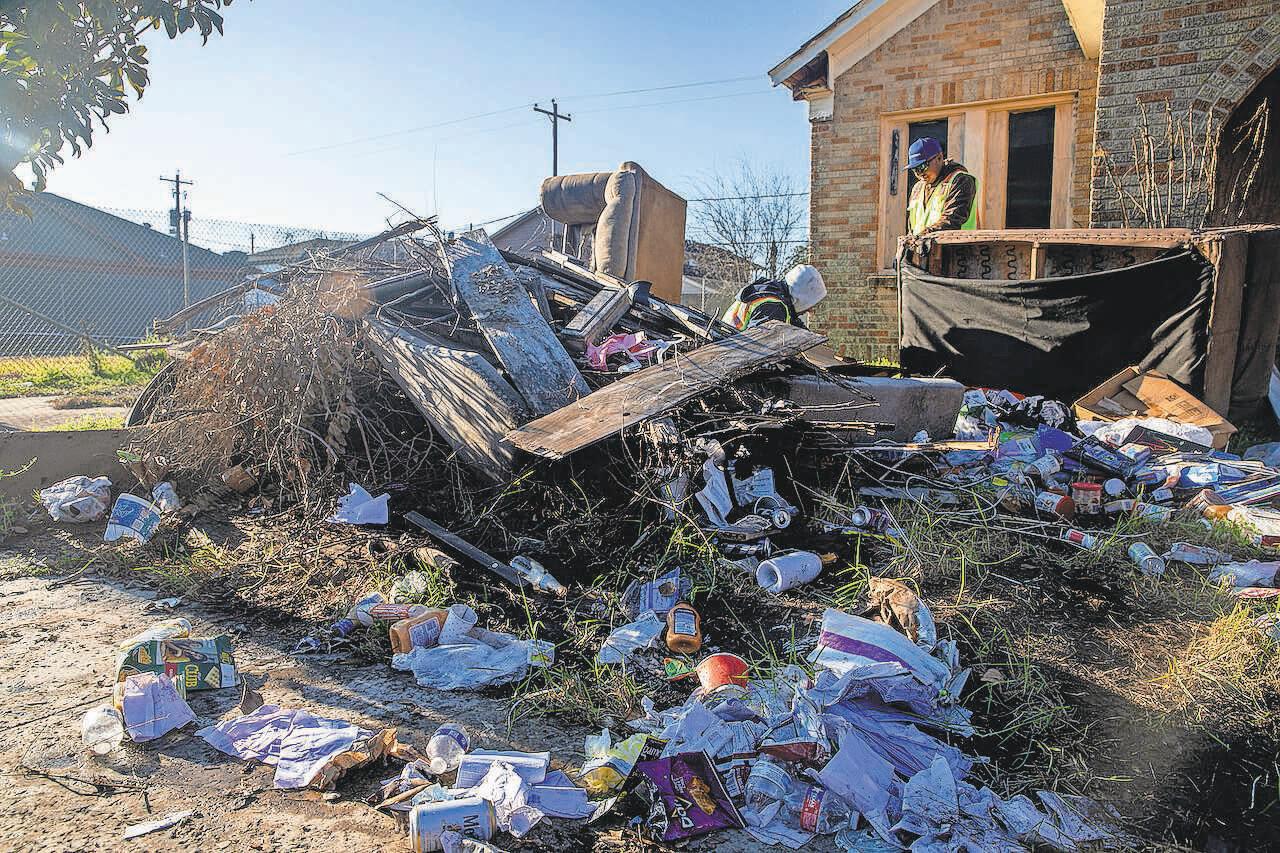
volunteering program for high school students, providing incentives like gif cards to keep them motivated to support the existing HOT team.
Other residents said that despite calling 311 for a follow-up and providing their reference number, no action was taken. Some residents complained of 311 closing cases without resolving the issues.
“311 does not independently close cases,” said Paula Walker, senior trainer of the Administration and Regulatory Afairs Department at 311.
She explained the complaint process:
A resident calls 311 to fle a complaint,
A 311 operator asks residents for their contact information and creates a case afer entering a service request,
Te operator then submits it to the correct department,
Te department then sends an inspector to investigate the case, who then creates a work order or resolves the case
Departments handle closures after investigations, though work orders may still be pending. Residents can track service requests online, while illegal dumping reports depend on property ownership and location-based classifcations.
Illegal dumping cases that reach the municipal court are conducted by a prosecutor, confrmed Oswald James Scott, Jr., administrative judge for the City of Houston. Te judges “act as a referee in a case.” He explained that if a case goes to trial and a resident does not show up, the case gets dismissed.
Urging residents to report illegal dumping and provide evidence like photos and license plate numbers to assist prosecutions, Scott, Jr. said most residents do not come forward. He stressed that stopping illegal dumping requires community engagement.
“Everybody has a right to confront the accuser,” said Scott, Jr., “If you as a witness do not show up in court, that case is probably going to be dismissed. You may
not want to be a rat, but if you don’t take the opportunity to come forward and face that person, then you are really not going to stop the problem.”
Mark Wilfalk, director of the Solid Waste Management Department, expressed concerns about the department being undervalued, despite its critical role. He contrasted Houston’s solid waste budget of $100 million with Tampa’s $125 million budget, despite Houston being three times larger.
Last year, the department introduced an on-demand heavy trash pickup program to tackle illegal dumping, allowing residents to schedule pickups online. Wilfalk said Solid Waste employees would only pick up heavy trash once residents call for help, instead of driving around the city looking for trash to pick up.
The U.S. Department of Education has launched an investigation into Rice University and 44 other institutions over allegations of racial discrimination in their admissions and academic programs. Scan the QR code to read the story and more bites.

By Tannistha Sinha
The new State Representative in District 146 Lauren Ashley Simmons has pledged to fight against abortion bans, censoring the teaching of Black history in schools, banning books in school libraries, discriminating against LGBTQ+ families, suppressing voting rights and millions of Texans being kicked off health insurance.
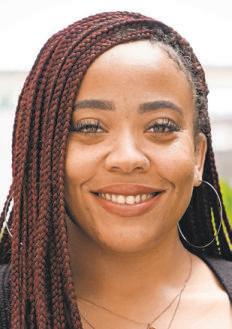
“When my community is under attack, I’m under attack,” she told the Defender. “I’m very defensive about not protecting just myself but others who aren’t able to…it’s time for us to be bold, to be brave, and not cower because that’s what they want. They want to erase us and remove us from public life.”
Simmons represents parts of south and southwest Houston, including neighborhoods such as Westbury, the Willowbend area, Brays Oaks and Sunnyside. She defeated incumbent State Rep. Shawn Thierry in the 2024 March primary, receiving 64.6% of the votes. In the Nov. 5, 2024, elections, Simmons (77.7%) defeated Republican Lance York (22.3%).
Looking back
Simmons, a graduate of Jack Yates High School and the University of Texas, became a mother in her

freshman year at 19 and battled poverty. She said she did not understand “how expensive it is to be poor.”
It’s time for us to be bold, to be brave, and not cower because that’s what they want.”
“I truly was able to connect the dots between what it means to be working class in this society, and just how much our lives are dictated by the jobs that we have access to, by the education we have access to,” Simmons said. “And I just wanted to help people fight for their rights.”
After joining the labor movement and finding a purpose in life, Simmons says that she now advocates for policies and working groups in the 89th legislative session.
Simmons, the mother of a high school senior and a 10-year-old, said her “deep passion” for public
education stemmed from having family as educators, who instilled a “deep love and understanding of just how critical public education was, especially in a Black community.”
Today, she believes that education, or what she calls the “great equalizer,” is “under attack” after the Texas Education Agency takeover of the Houston Independent School District.
Simmons said the TEA takeover is a political move.
“I hate to sound conspiratorial, but you can’t tell me there’s not some type of connection between our governor who spent the whole almost last legislative session, and then four special sessions trying to push a voucher plan through, and then the takeover of the largest school district in the state,” she said. “If funding is based
on enrollment, then of course schools in our predominantly Black neighborhoods...are gonna be even more under-resourced than campuses that are attracting more students.”
On MAGA policies and the Texas legislature
Simmons expressed her frustrations about the dismantling of Diversity, Equity and Inclusion (DEI) policies, inaction on book bans, gender-affirming care and attacks on critical race theory, which can lead to funding issues at universities, particularly HBCUs.
“Especially now when we’re talking about banning books that contain history and antiDEI measures…but there is a reason why those things were in place,” Simmons said. “It was because, for a really long time, our stories were not told. Our stories did not matter, and our voices did not matter. I really, now more than ever, am so adamant about not just me but all of us getting back to our history, getting back to our roots and pushing our legacies forward that our ancestors left for us.”
By Tannistha Sinha
Houston Independent School District (HISD) is facing a crisis: thousands of students are leaving traditional public schools and enrolling in charter schools instead. HISD’s student transfer data shows that in the last school year alone, more than 50,000 students who live within HISD boundaries opted to attend a charter school network and more than 4,000 transferred to another traditional school district.
These transfers, among other factors, have impacted HISD’s enrollment numbers, leading to a net loss of more than 30,000 students over the last 10 years when you consider new students coming into the districts.
The decreasing enrollment trend raises concerns about the reasons behind their departure and how it will impact the school district’s future. It is important to ask what is driving families away from traditional public education in Houston and choosing other avenues.
For some parents, charter schools provide an alternative opportunity to remove their students from HISD, a school district undergoing an overhaul with Superintendent Mike Miles at the helm. Since he introduced the New Education System (NES) that follows a centralized curriculum and test-based evaluations, parents and teachers have been vocally protesting against his measures.
The rise in charter school enrollment
In the 2023-24 school year, a majority of the students who transferred [56,219] went to these five charter schools:
KIPP Texas Public School: 14,221

Credit: Tannistha Sinha HISD Enrollment 2019-2024
YES PREP Public School: 13,363
Harmony Public Schools: 2,863
International Leadership of Texas: 2,346
Houston Gateway Academy: 1,948
Enrollment at Houston-area charter school campuses grew by 25% from the 2014-15 school year to 2023-24, according to a recent analysis. By comparison, enrollment at a traditional public school campus decreased by about 3%.
Supporters of charter schools believe that they give parents more options, especially in areas where public schools have struggled for years. Charter school curricula are often flexible and more specialized focusing on STEM, arts, or project-based learning, and they may more efficiently adapt to the needs of
their students.
Opponents argue that charter schools siphon money away from public schools, which are already underfunded and disproportionately serve low-income and minority communities. While they are publicly funded, charter schools are managed by unelected board members who are not directly accountable to taxpayers. This could lead to a lack of oversight.
Also, public school funding in Texas is tied to student enrollment. Therefore, each student who leaves HISD for a charter school takes those dollars with them. However, this is no different than when a student moves away or transfers to another school district.
This exodus may also put additional pressure on teachers who remain in public schools. With fewer resources and smaller budgets, they are forced to do more with less.
District leadership considered dwindling enrollment in its budget considerations while discussing HISD budget strategies and long-term fiscal sustainability, and suggested potential school closures and additional sources of funding.
Miles’ preliminary budget overview accommodated a $47 million decrease, including teacher position cuts, a loss of 30,000 students in the last decade and a projected 8,000-student decline in the next school year.
HISD has tough decisions ahead. It is imperative to understand the root causes of why families are opting for charter school enrollment and address them, aside from taking measures that already anticipate more loss in numbers.
One of the most common misconceptions in the ongoing debate between natural and non-natural diamonds is that it’s impossible to tell the difference between the two. Research shows that almost half of consumers are unaware that laboratory-grown diamonds (LGDs) can be detected from their natural counterparts. For consumers who are investing in diamonds and diamond jewelry, this means there is perhaps a lack of assurance that they are getting what they think they are paying for.

This spring, with the introduction of a new verification device, the DiamondProof, to retail stores for the first time, consumers will be able to make informed purchasing decisions and distinguish natural diamonds from non-natural diamonds, like LGDs and other diamond simulants, with a zero percent ‘false positive rate’.
Developed by De Beers Group, the DiamondProof technology is able to detect the distinct chemical compositions of natural diamonds, allowing for precise and rapid identification. Early adopters of the DiamondProof include some of the largest jewelry retailers in the U.S., and the device will also be available in a number of independent retail outlets to ensure that any diamond consumer is able to try out the technology and gain assurance on their own jewelry, or diamonds they are planning to purchase.
The first DiamondProof prototype instrument was unveiled last June at the JCK show in Las Vegas, the premier jewelry expo for retail professionals. Many quickly jumped on board and ordered the device for their stores,
noting the ability to rapidly and easily screen both loose diamonds as well as stones set in jewelry.
“Natural diamonds and lab-grown diamonds are two fundamentally different products. Natural diamonds are rare, one-of-a-kind miracles of nature that come to us from the earth through heat, pressure and time.” notes CEO of De Beers Brands Sandrine Conseiller. “This incredible journey is what makes them the ultimate marker of life’s most profound emotional moments. Consumers should be able to have confidence in such a meaningful purchase, and DiamondProof allows retailers to offer them greater peace of mind. We are in a new era of transparency at retail, and customers deserve to know what they are buying.”
“By rapidly and reliably identifying whether a diamond is natural, DiamondProof is instrumental in enhancing consumer confidence in natural diamond purchases. Consumers deserve clarity and having DiamondProof available in retail settings helps them make informed decisions, while appreciating the unique value and story behind each natural diamond. With decades of leadership in synthetic detection technology, we are committed to providing the level of transparency that consumers expect,” stated Sarandos Gouvelis, SVP, Pricing, Product and Technology Development at De Beers Group.
For anyone looking to evaluate and verify their own diamond jewelry, or looking for assurance in new diamond purchases, a major retailer near you will soon have a DiamondProof available.
By ReShonda Tate
The most significant pandemic of our lifetime arrived at a time when the United States was already grappling with deep societal fractures.
The growing partisan divide, declining trust in institutions and an increasingly fragmented information landscape all shaped the nation’s response to COVID-19 in March of 2020. These pre-existing conditions fueled a polarized reaction to the crisis, with nearly three-quarters of U.S. adults (72%) now believing that the pandemic did more to divide the country than bring it together. Looking back more than five years later, three-quarters of Americans say the pandemic took a personal toll on their lives. Among them, 27% report a major impact, while 47% describe it as minor. Beyond the personal struggles, the virus left a lasting mark on public health, work, religion, education, business and technology—key areas that continue to reflect the pandemic’s profound influence.
The lingering health crisis
The pandemic’s health impact remains substantial, with millions still battling long COVID, a condition characterized by persistent symptoms long after the initial infection has cleared. Long COVID is arguably the most significant hangover from the pandemic, affecting everything from the state’s workforce’s stability to its health systems’ viability.
Dr. Noah Greenspan, founder of the Pulmonary Wellness Foundation, emphasizes the importance of targeted therapy for long
COVID patients. “Compression garments, electrolyte supplementation, balancing activity with rest and oxygen therapy have all shown to be helpful,” he explains.
Vaccine perception and public health preparedness
The development of COVID-19 vaccines was an unprecedented achievement, credited with saving millions of lives worldwide. Yet, public opinion on vaccines has remained deeply divided. A Pew Research survey found that while many Democrats planned to receive the latest booster (39% had received it, 23% planned to), the overwhelming majority of Republicans (81%) said they would not get an updated vaccine.
This skepticism has bled into attitudes toward other vaccines, including those for childhood diseases. A March 2023 survey showed a 12-percentage-point drop in support for requiring vaccines in schools.
CDC data also reveals declining kindergarten vaccination rates for measles, polio and chickenpox.
Texas, which entered the pandemic with one of the highest uninsured rates and an underfunded public health system, remains vulnerable. The state now spends less per capita on public health than before the pandemic. Local officials have also seen their authority to enforce health protections weakened, making Texas less prepared for future outbreaks.
COVID-19’s psychological toll is another lasting legacy. Texas Children’s Hospital reported an 800% increase in emergency visits for mental health crises compared to
temporarily and, in some cases, permanently close their doors. Remote work became a regular reality. Schools, K – college, converted to distance learning models that then transitioned into hybrid learning spaces, with some students physically present, others present online and still others absent due to the harsh realities of the digital divide.
By Aswad Walker
March 13, 2025, came and went with little fanfare, quite unlike the event for which that date marks. Five years ago on the 13th of March, the U.S. officially shut down in response to the COVID-19 global pandemic.
That shutdown forced businesses to
And as the pandemic progressed, death toll numbers rose to surreal levels. Yet, still, masks and vaccines were used as political debate fodder.
Don’t forget, a mini-revolution erupted regarding whether or not to mask up. The same was true for vaccinations.
pre-pandemic levels. Schools, already underfunded, struggle to provide adequate support for students facing pandemic-related trauma.
The pandemic triggered major shifts across industries, and Houston continues to feel the economic ripple effects, with particular impacts on businesses.
Sambuca Restaurant closed after 22 years. The spot, which featured nightly live music, was located at the base of the Rice Hotel in downtown Houston. The owner said in a Facebook post, “In recent years we face challenges that have tested our resilience, the changing climate of our city, with rising homelessness and crime, coupled with the lingering impacts of COVID....created a perfect storm that we could not weather, though we fought with everything we had to keep our doors open. We’re closing this chapter with gratitude carrying countless memories over the past 22 years.”
A Constant Contact small business survey on the lasting impact of COVID found a number of issues, from financial strain to supply chain issues to mental and emotional toll. However, Constant Contact’s Director of Small Business Success, Dave Charest, said resilience is what they saw most in surviving businesses.
“Many businesses that maybe weren’t so keen on the shift to digital really realized and saw the value in doing that. They adapted to figure out how they could communicate with their customers and offer virtual services, and think about their businesses differently,“ he
The Defender asked Houstonians what lessons they and the rest of society learned or failed to learn from the largest pandemic in generations.
added, ”And so they’re really focused on figuring out how they get to long-term success and they have this growth mindset. And pretty much the entrepreneurial spirit is still very much alive, and 95% of the people that we talk to actually said if they were given the opportunity again that they would still start their own business.”
From a marketing standpoint, business challenges due to the pandemic included maintaining old customers, acquiring new clientele and standing out from the proverbial crowd.
“When you start thinking about ‘What do I do right? How do I start to overcome that?’ What they’re telling us is that they’re looking to build stronger customer relationships and learning new marketing strategies and adopting new tools, but even leaning into technology like AI and automation to help them work more efficiently.”
Religious institutions adapt to a changing landscape
The COVID-19 pandemic disrupted many aspects of daily life, including the traditional practices of worship for the Black church community.
For young Black people, the pandemic accelerated a trend that was already in motion: a growing disconnection from the church.
As churches closed their doors and shifted to online services, many young congregants found it challenging to maintain their spiritual routines, leading to a noticeable decline in attendance and engagement. Now, years after the pandemic, churches are finding new ways to bring people back into the fold.
% of U.S. adults who say that all in all, they feel the COVID-19 pandemic...
Didn’t have much impact either way
Did more to bring the country together No answer 1
Source: Survey of U.S. adults conducted Oct. 21-27, 2024. “5 Years Later: America Looks Back at the Impact of COVID-19” PEW RESEARCH CENTER
Before the pandemic, young Black Americans were already exhibiting signs of drifting away from the church. Factors such as the increasing secularization of society, the influence of social media and a perceived disconnect between the church’s teachings and contemporary issues were contributing to this trend. The pandemic further exacerbated these issues by severing the in-person
connections that many found vital to their spiritual lives.
The shift to online services provided a temporary solution but it also exposed the challenges of maintaining community in a digital space. Many young people reported lacking personal connection and engage ment during virtual services, which often felt more like a broadcast than a communal worship experience. This led to a signifi cant drop in attendance among younger congregants, that is just now seeing a turnaround.
“I grew up in the church,” said 22-year-old Camille Young, who attended Windsor Village United Methodist Church. “After the pan demic, I started watching online... every Sunday, then once a month, until I just started sleeping in on Sundays and never went back. I think not being there in person just led me to find other ways to get my spir itual nourishment.”
Moving forward
Over one million Americans lost their lives to the virus, and count less others suffered severe illness. Despite this, many Americans have moved on— only 21% now consider COVID-19 a major public health threat and a majority (56%) believe it is no longer a pressing concern. However, the long-term effects are far from over.



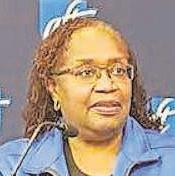
Education Reports nationally suggest K – 12 students are still playing catch-up regarding the learning lost during the pandemic. Jackie Anderson, president of the Houston Federation of Teachers, contends school districts, namely the Houston Independent School District (HISD), haven’t learned the lesson of how important support systems are for healthy learning environments.
“I think that we have not provided muchneeded social and emotional support for students and teachers,” said Anderson. “No
one was unaffected by COVID and yet, some legislators wanted us to resume business as usual. Not enough thought or planning to insure success for students was integral to the return process.
“The current federal/state administration is still playing the blame game when it comes to our student success. In actuality, the crisis was manufactured by the finger pointers.”
Job training
Renée G. Omoyeni, MS, BSN, RN, founded CompassRN, a Houston-based, nurse-led nonprofit dedicated to mentoring and supporting students—especially those
from underrepresented communities—who aspire to enter the nursing profession. Omoyeni made this move in large part because of the pandemic.


“American students have suffered profound learning loss since the pandemic, and many are not taking the challenging math and science courses needed to prepare them for college,” said Omoyeni, who hopes society has learned how critically important it is to bridge the digital divide.

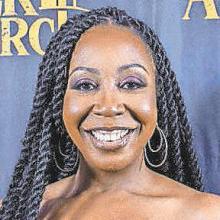
Natasha Boyce Brown, founder, and CEO at Money Savvy Sista LLC, believes many people have internalized how important health and wellness are in large part because of the devastation to the health and wellness of people all over the planet during the COVID pandemic.
“Many have adopted the life approach of wellness by any means necessary,” said Brown.
“Continue to walk, drink water, talk to family,
“Being able to access digital study guides and practice tests can help students prepare for nursing program entrance exams anywhere at any time—whether at home, at the library, during study hall, or on a break during a parttime job,” Omoyeni explained. “Moreover, clinical simulations and virtual training courses are key ‘no-fault’ ways students can continue honing the skills they will use every day with patients.”
and make good memories. Otherwise, you will age. Your anxiety will shut you down and make your body ache. We must continue to live and protect our spiritual, physical, mental and emotional health.”
Fort Bend County Judge Roderick Garner says the pandemic spotlighted a lesson a bevy of Black leaders over the decades have pushed Black people to learn.
collaborative home-schooling efforts, our communities suffered with very few remedies for the absence of formal public education. I find the education deficit created by COVID had and is still having an adverse impact on our children and their educational maturity.”
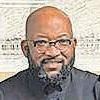
“The COVID lockdown provided insight into how ill-prepared the Black and Brown community is when it comes to self-sufficiency,” said Garner.

Garner believes the absence of self-sufficiency revealed during the pandemic regarding education touches all areas of life.
“While our white counterparts maintained a mitigated balance for their children through
“Our ability to assimilate should not take precedence over our responsibility to provide for our own in a meaningful and systemic way. Hopefully, our communities will pursue avenues of collaborative efforts geared toward sustaining our future through preparation, education and proper planning,” added Garner.
By Aswad Walker
Dr. Gloria Batiste-Roberts, head coach of the internationally renowned Texas Southern University (TSU) Debate Team, just couldn’t keep it to herself.
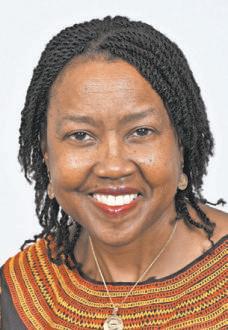
Though her 17 students had just culminated a grueling competition—the 35th Annual International Forensics Association’s (IFA) Speech and Debate Tournament held halfway around the world in Incheon, South Korea—Batiste-Roberts jumped on the phone and shared the news with the Defender.
“We just won first place, in the International Championship, with the International Forensic Association Tournament, and we are so excited to be a winner again,” said Batiste-Roberts. “This is our fifth win internationally.”
The team’s last international victory came in 2018 in Montreal.
In addition to winning the coveted firstplace sweepstakes award as the overall champions, the team earned 21 awards, including first place in Poetry, Dramatic Interpretation and Duo Dramatic Interpretation. They also earned fourth and fifth place in the Parliamentary Debate Speakers Awards.
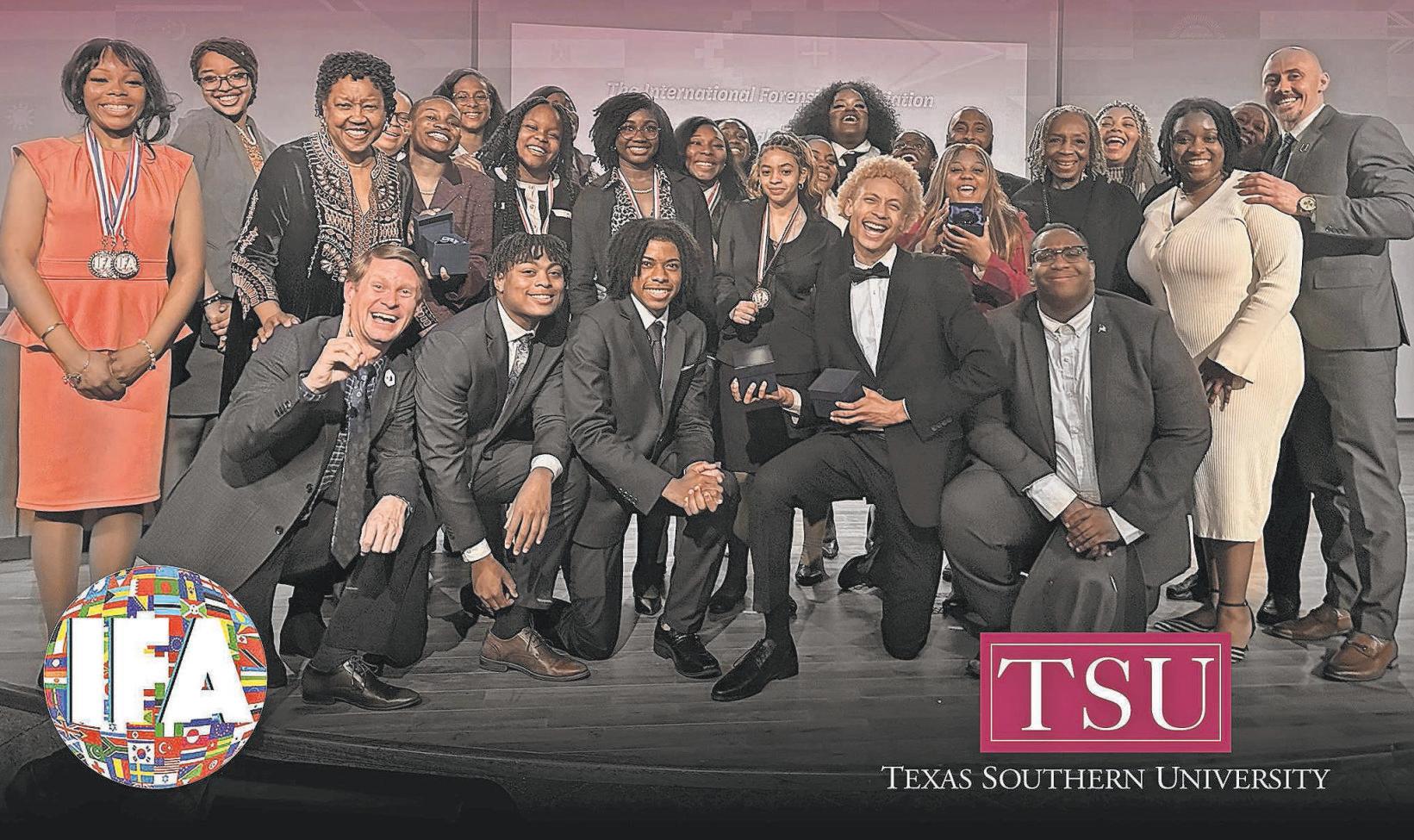
that featured 27 teams from across the U.S. and around the world.
And that’s not all.
“One of our assistant coaches, Ms. Trendi
The Metropolitan Transit Authority of Harris County, Texas (METRO) is planning to issue the procurement documents listed in this advertisement.
RFQ No. Doc1480499775: Pre-Employment Physical Examination On An ‘As Needed Basis’ Solicitation will be available on or about 03/17/2025. Prospective bidders/proposers can view and download these solicitations by visiting METRO's website at ridemetro.org/Open Procurements. If you are unable to download the documents or are having difculty, please contact 713-739-6886 or email Contracts/Property Services at propertyservices@ridemetro.org.
Houston Downtown Management District (HDMD) will receive bids for the
Street Promenade project, located in Downtown Houston, primarily the 100 – 1100 blocks of Main Street from Commerce Street to Dallas Street. Bids will be received until 11:00 AM, local time on Wednesday, April 23, 2025, online in CivCast. Bids received after this time will not be accepted.
Beginning Thursday, March 13, 2025. Bidding Documents will be available at www.civcastusa.com. Any addenda will be distributed online at www.civcastusa.com.
A MANDATORY pre-bid conference will be held online at 11:00 AM local time, Tuesday, March 25, 2025. All prospective bidders are invited to attend. Bids will be ruled non-responsive if received from a bidder who did not attend the pre-bid conference.
Bidders shall comply with City Ordinance 95-336 (March 29, 1995) and Exec. Order No.1-2 (June 14, 1995), and City of Houston Afrmative Action and Contract Compliance Division Minority/Women Business Enterprise (M/WBE) Procedures (June 1995). The successful Bidder will be required to make good faith eforts to achieve an M/W/ DBE participation goal of 8 percent.
Nguyen, was nominated and elected for an office. She is the international liaison to the IFA executive committee, and that is a position we’re very proud that she will hold,” said Batiste-Roberts, of Nguyen, who also works in TSU’s Student Services Office.
TSU Debate Team members had their sights set on the South Korea competition for an entire year.
“When we competed in this competition in Ireland last year, the result wasn’t what we prepared for and it motivated us to work harder throughout the year to be ready for this moment,” said Debate Team member Jaila Hampton. “It was gratifying to compete at the level to which we knew we were capable. We are excited to bring another international championship back to Texas Southern.”
Members of the team included: Adaiah Amaechi, Aaliyah Jackson, Brooke Logan, Jaila Hampton, Erwen Little, Myesha Owens, Morgan Williams, Valerie Mulure, Jordyn Wardsworth, Kaylee Flowers-Burris, Nia Harrison, Amalia Charles, Alexander Williams, Amaya Tootle, Cherish Johnson, Zyias Richards and Justice Garcia.
The team was accompanied by seven assistant coaches - Jordon Williams, Sondera Malry, Atty.
Marcus Ester, Jessica Johnson, Chantule Baccus, Mikayla Wallace and Nguyen.
“All of our assistant coaches are former members of the Debate Team, so they understand the history of the Debate Team. We turned 76 years old this month, and under the spirit of Dr. Thomas F. Freeman, who founded the team in 1949, we are so excited about the tradition of the team and the continued outstanding performances of our students,” added Batiste-Roberts.

By Laura Onyeneho
Terence Narcisse is the founder and executive director of the East Harris County Empowerment Council (EHCEC).
He has dedicated his life to advocating for underserved communities and ensuring that families in East Harris County have access to resources, opportunities, and a better future.
As Narcisse, 34, describes it, the East Harris County Empowerment Council is “the regional development organization responsible for bringing opportunity and resources” to this often-overlooked corner of Houston.
The organization has transformed the lives of countless individuals in the six communities that comprise East Harris County: Crosby, Channelview, Sheldon, Galena Park, Jacinto City and North Shore.
Narcisse’s passion for community service is deeply rooted in his upbringing. Raised in the close-knit neighborhood of Barrett Station, he learned the value of sharing, interconnectedness and collective responsibility from a young age.
“My family is massive,” he says, recalling a childhood spent surrounded by a sprawling network of aunts, uncles, cousins and grandparents. This early immersion in a culture of kinship and mutual support shaped his worldview and laid the foundation for his future endeavors.
However, like many young people, Narcisse initially felt a pull towards the opportunities that seemed to lie beyond the familiar boundaries of his community.
“My goal was to get as far away from the east side as possible,” he admits, echoing a sentiment shared by many of his peers.
But fate, in the form of the tragic loss of his friend in a car accident at the age of 18, forced him to re-evaluate his aspirations and confront the true meaning of legacy.
“It was a stark reminder that we only get so
much time here on earth,” Narcisse said. “It made me realize how important it is to give back.”
His journey as a community leader began with small acts of service – cleaning cemeteries, organizing events and providing essential resources to those in need. These efforts, born out of a desire to honor his friend’s memory, quickly evolved into a movement that resonated with the community’s deep-seated yearning for change and recognition.
The path to establishing the East Harris County Empowerment Council was challenging. Narcisse, who was only 18 years old then, encountered skepticism, opposition and even outright hostility from some within the community. With his mother’s unwavering support and his own growing conviction, he refused to be deterred.
He sought knowledge and attended a grant writing class, using part of his rent money to pay for the course. The class instructor even gave him the essential “do-it-yourself” kit for establishing a 501(c)(3) non-profit organization as a gift. At the time, he was a first-generation college student at the University of Houston, navigating higher education challenges while laying the groundwork for his nonprofit.
“Balancing school and launching community projects wasn’t easy, but I knew the work had to be done,” he said. “There was no blueprint for this. I had to learn everything—how to build relationships with donors and create programs that truly served people’s needs.”
One of the biggest challenges was convincing others that East Harris County deserved the same level of attention and resources as urban centers like Houston.
“People often overlook communities like ours because we’re not in the spotlight. But the need is just as great—if not greater—because we don’t have the same infrastructure or access to services,” he said.




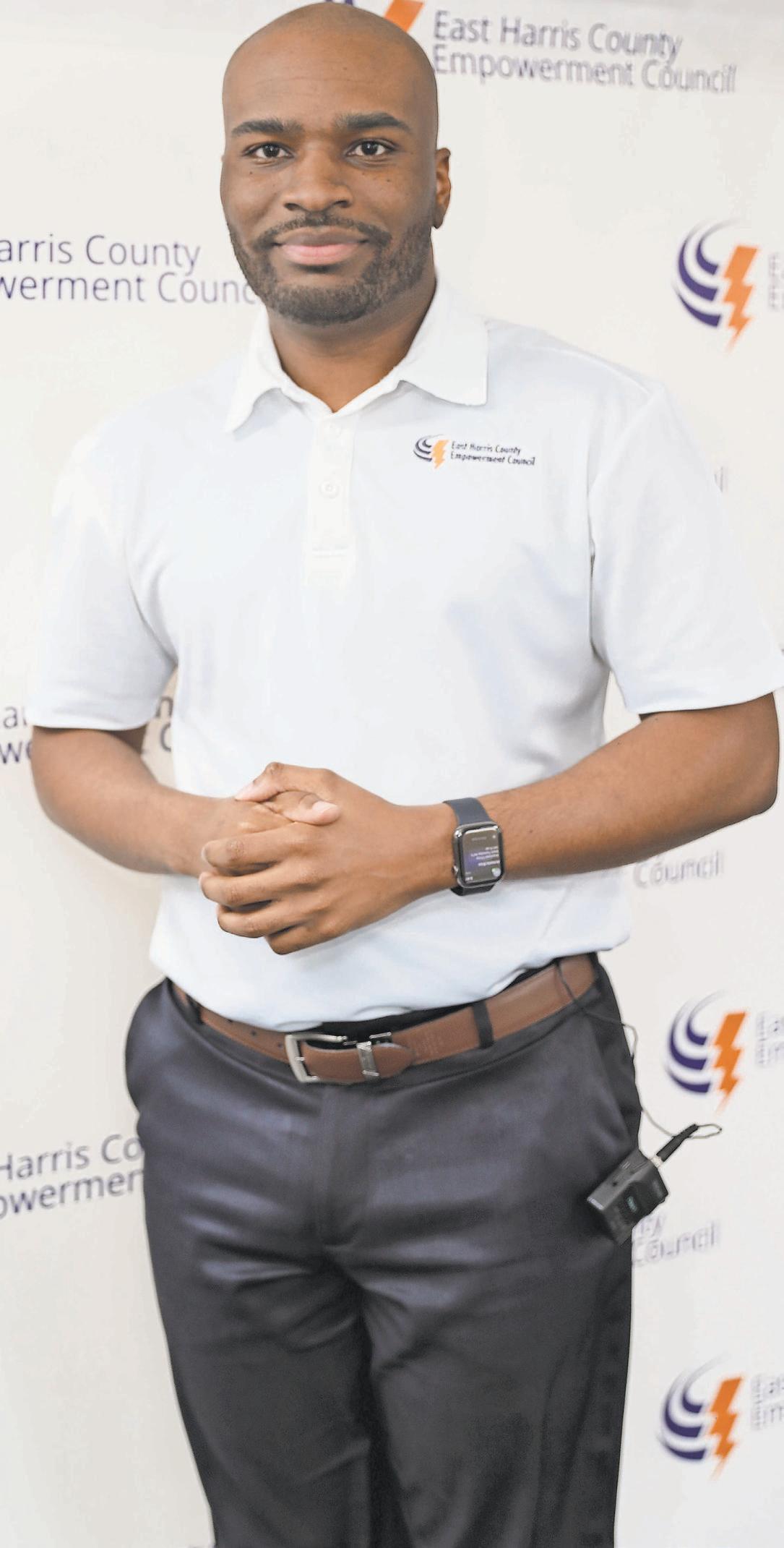
By Terrance Harris
Janae Jefferson will be the first to tell you how good softball has been to her and how her goal is to give back to the sport.
But the virtual “Rockstar” softball player wasn’t sure what that looked like. That was until Prairie View softball coach Vernon Bland, who was working as an assistant coach of the Women’s Professional Fastpitch squad, the Texas Smoke, this past summer, started getting in her ear about coaching.
While the former standout at Nimitz and the University of Texas still has plenty of playing aspirations, like making the 2028 U.S. Olympic Team, some of the conversations with Bland started to resonate.
It wasn’t long before Jefferson took Bland up on his offer and decided to become a graduate assistant coach for the Panthers.
“We kind of built that relationship over time and one day at practice he was like, `Does anyone want to be a (graduate assistant coach)?’” Jefferson recalled in a recent conversation with the Defender. “I was like, ‘Yes,’ and it’s right down the street from me.”
Next thing anyone knew, Jefferson enrolled in Prairie View to pursue her MBA last summer and began her coaching journey as a graduate assistant with the Panthers’ program. The softball star didn’t see this in her immediate future a year ago but is now all in.
She thoroughly embraces her time on an HBCU campus and working with student-athletes who are similar to her.
“It’s definitely an adjustment from the PWI that I came from,” Jefferson said. “I got to experience my first Homecoming and things like that at an HBCU. That was a lot of fun for me, being around people who look like me and everything. It was just an awesome experience.
“In coaching, I feel like I fit in with the coaching style of Coach Bland and Coach (Joeseph) Lane. I feel like it’s a perfect fit. It kind of worked out.”
Bland has certainly been impressed with what Jefferson has brought to his staff and the team since the fall.
“Janae is so humble. If you didn’t know her, you wouldn’t know. You would have no clue who she is or what she has done in this game,” Bland said. “She has just come in and fit in with the coaching staff. We always laugh because she just came in and fit right in.”
But make no mistake, Jefferson is about as close to royalty as you will get in softball.
She had a stellar four years (2018-22) at



UT, where she led the Longhorns, her senior year, to the 2022 Women’s College Series for the first time since 2013, and they finished as runners-up. The four-time All-American infielder finished her collegiate career as the program record-holder in batting average (.424), games started (269), runs (222), hits (362), and doubles (55).

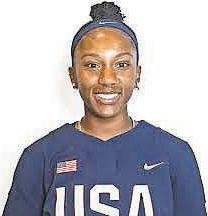
Her success has continued at the Women’s Professional Fastpitch level, where in 2023, Jefferson earned the league’s Player of the Year distinction in her first season as a pro. The fourth overall pick in the 2022 Athletes Unlimited Softball College Draft hit .438 for Texas Smoke with a .523 slugging percentage and a .580 on-base percentage, helped the team to back-to-back WPF Championships and along the way, took home the Championship Series MVP.
So, not only were the Prairie View players impressed to have a coach of Jefferson’s caliber leading them, but the adulation has been extended to opposing teams and their fans.
“Having someone like her around who has that softball IQ that we might not have or know, it’s really big,” said Prairie View


been able to turn to in her role as the Panthers’s graduate assistant coach.
I
like the fact that I know I’m having an impact on the younger generation of softball and that they look up to me. It’s cool.”
JANAE JEFFERSON
senior centerfielder Ja’Naiya Thomas, who transferred in this year from the University of Houston. “And literally, everywhere we go, people were talking about Janae Jefferson is going to be here and making posts about her and knowing that she is our coach is definitely one of the biggest flexes we can have.”
Hearing that she is considered a “big flex” brings a smile to Jefferson’s face.
“I’m humbled hearing that,” she said. “I don’t really see myself as a major flex, but I guess other people see me in that light and see me as a role model, so it is very comforting. I like to hear it. I like the fact that I know I’m having an impact on the younger generation of softball and that they look up
to me. It’s cool.”
Jefferson definitely appreciates the opportunity to work with the Panthers and is enjoying the connection with the players who aren’t too much younger than her.
“They be talking my head off,” the 26-year-old Jefferson said with a laugh.
“They ask about how professional life is, how it was at UT, my career there and how I started in the game. I’m an open book for them. I want to share my story and see how far softball can take you. I’ve traveled all over the world playing this sport. It’s something that I really enjoy doing.
“I tell them to keep following your dreams and reaching for your goals and the sky is the limit.”
By Jimmie Aggison
Natalie Greene, a 6-foot senior post/forward at Willowridge has made a name for herself both on and of the basketball court.
Known for her incredible skill and resilience, Greene recently led the Willowridge girls’ basketball team to an undefeated 12-0 season in 4A Region III District 21. She averaged 18 points and 13 rebounds per game, earning her the title of MVP of 4A Region III District 21.
“Being the most valuable player shows that my work is paying of,” Greene said. “From not knowing anything about basketball to becoming the most valuable player for the district is very surprising.”
Tis remarkable feat is even more inspiring, considering Greene had never really played basketball before her freshman year. Despite this, she quickly transformed into a four-year varsity letterman, demonstrating that hard work and determination can defy expectations.
Before basketball, Greene was into ballet, having been a member of the Banbury School of Dance since she was fve years old. She attended Meyerland School for the Perform ing Arts, studying dance and piano, seeing the arts as a part of her future. However, her life took an unexpected turn when a teacher noticed her height in the hallway and men tioned she should play basketball.
“Tat was a total shock for us,” said Greene’s mother, Nakia Cooper. “I was dead set against it because I wanted a ballerina, not a basket ball player. I was angry in the beginning
ABOUT NATALIE GREENE
Class: 2025
IG: @MMXNatalie
Twitter: @Nataliejgreene
Position: Forward
Height & weight: 6-feet-0, 160 pounds
Favorite artist: Domani
Status: Committed to Gallaudet University
Favorite subject: English Shout-outs: Coach
Joseph Randolph, Coach
Jason Williams, Coach
Tiffany Collins, Coach
Jeremy Peters, Coach Ben Simmons, Coach Cynthia Cooper
because, in my mind, they changed our plan.”
It was at this pivotal moment that Greene’s journey as a basketball player began—an entirely new path that would come with unique challenges.
Born deaf and hard of hearing, Greene faced a major obstacle from the start. She is deaf in her right ear and struggles with background noise, which can make it diffcult for her to hear everything happening around her on the basketball court. While she can hear better in isolation, the chaos of the game—where the cheerleaders are chanting, coaches are yelling instructions and referees are blowing whistles—magnifes her hearing challenges.
“It’s hard to explain because my disability is normal to me,” Greene said. “Basketball is a rhythm game. On the court, I ‘feel’ the game diferently. When I couldn’t hear the plays, I watched the game and reacted to others.”
In the beginning, communication was a challenge. At
responding. Afer being made aware that she was hard of hearing, the coaches and players adapted to repeating themselves during the games and all just kept moving.
Greene continued to excel in basketball, demonstrating that physical challenges don’t have to defne one’s capabilities.
Of the court, Greene is just as impressive. With a 4.1 GPA, she serves as the student body president, won the Miss Willowridge 20242025 title and is a member of the National Honor Society. She is currently in WHS’s Pathways in Technology Early College High School (P-TECH) program and will graduate this May with her high school diploma and an associate degree in computer science.
In college, she plans to pursue a degree in American Sign Language with a focus on Black Deaf Studies and a degree in business administration.
“I believe my hearing loss is hereditary because I have an aunt who also has single-sided deafness,” Greene said.
another hurdle for Greene as many schools she considered didn’t offer an ASL major. Tat is until a TikTok video about Gallaudet University—a renowned university in Washington, D.C. for deaf and hard of hearing students—popped up on her feed.
“I found Gallaudet on social media because a TikTok said, ‘My deaf PWI has a dance team,’ and that seemed really intriguing,” said Greene. “I quickly texted my mom and told her.”
Coincidentally, just the day before, Greene’s mother had spoken to a co-worker who is an American Sign Language interpreter and mentioned Gallaudet University.
“Me being a protective mom, I wasn’t in favor of her going so far away from home, so I didn’t think twice about it,” said Cooper. “But afer Natalie sent me that text message and learning they had both ASL as a major and a basketball program, I knew that was God working.”
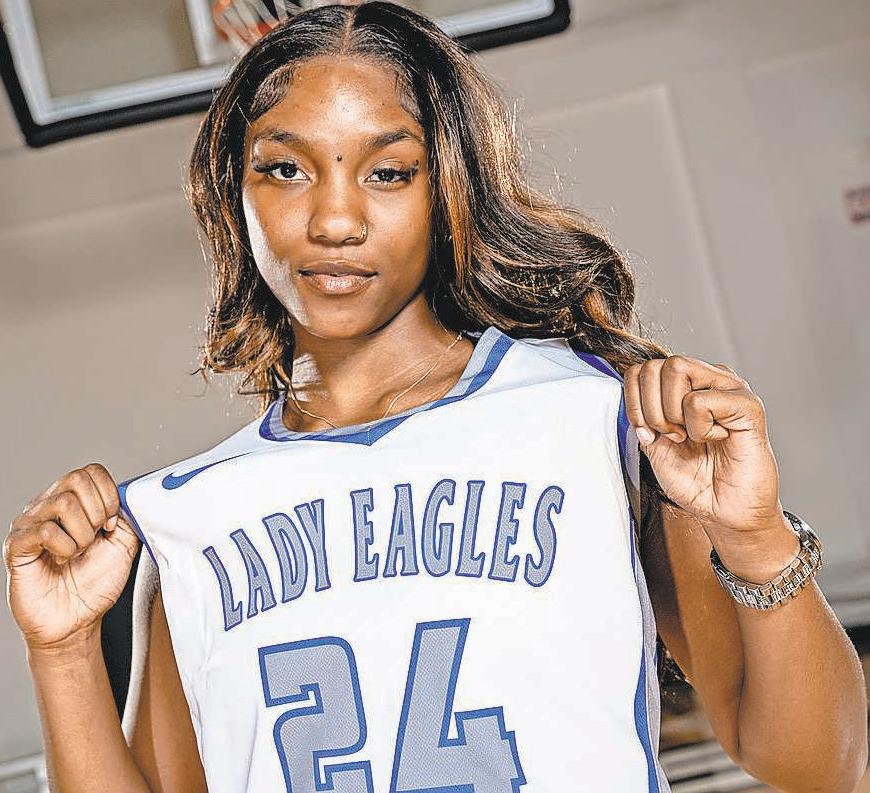
Afer reaching out to Gallaudet University’s recruiting coordinator, Shelby Bean, and sending Natalie’s HUDL film, her mother received a call from the university’s women’s head basketball coach, Stephanie Stevens. “Tey told me they were looking for a ‘big’ to join their team and were interested in meeting her,” Cooper said. “It was at that time I started to cry. We visited other schools that ofered Natalie spots on their teams, but none had the total package. Afer visiting Gallaudet, we knew it was a perfect ft.”
Gallaudet University, which just celebrated its frst conference championship in GU’s women’s basketball history, has become a beacon of opportunity for Natalie. It ofers the perfect combination of academics, athletics and support for her as a deaf and hard-of-hearing individual. It’s a full-circle moment for a young woman who started as a dancer and then became a basketball standout, all while refusing to let her hearing defne her.
“As a parent you always dream that your child leaves a legacy in the world,” Cooper said. “I believe Natalie will not only inspire other young Black women but will also pave the way for future generations of athletes and students with disabilities.”
By ReShonda Tate
Every month, The Defender Network shines a spotlight on Black women in Houston who are making moves, leading in their industries, and uplifting their communities. Black Women on the Move celebrates those who are making history now, highlighting their journeys, challenges and the impact of their work.
said. “But John told me, ‘That’s exactly why you’d be great for this job. You understand our largest stakeholder base—the artists.’”
Since joining HAA in 2022, Jackson has worked tirelessly to demystify the grantmaking process and ensure greater accessibility for artists across the city. Under her leadership as Director of Grants, applications have reached historic levels, doubling in some programs. Launching initiatives like the Grants Working Groups has helped foster transparency and community involvement in funding decisions.
“My initial focus is building strong community connections through meaningful stakeholder dialogue,” Douglas shares. “We want to bring new initiatives with the most significant community impact. I’m particularly passionate about literacy and wellness programs for youth and women from marginalized communities.”
to educating and empowering Black women about breast health.
Levingston emphasizes the stark disparities in breast cancer care for Black women—from late diagnoses to limited access to advanced treatment. Through SurviveHER, she aims to close these gaps by fostering awareness, providing screenings, and advocating for policy changes that ensure equitable healthcare.
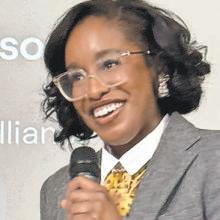
As the new CEO at the Houston Arts Alliance (HAA), Taylor Jackson is the first woman and person of color to lead the organization during its 19-year history. Jackson brings a deep passion for the arts and a firm commitment to ensuring equitable access to cultural programming. A connection through a nonprofit certificate program introduced her to then-CEO John Abodeely, who encouraged her to apply for the Director of Grants position at HAA.

tros
the
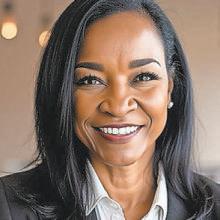

“I’ve never worked in funding before. I’ve been on the side of applying for grants,” she
Emelda Douglas has spent her career at the intersection of philanthropy, leadership and community engagement. Now, as the newly appointed Executive Director of the Astros Foundation, and Sr. Vice President of Community Affairs, Houston Astros, Douglas will take over for Paula McCann Harris, who led the Foundation for almost four years.
One of Douglas’ primary goals is increasing access to baseball for young athletes of color. Under her leadership, the Astros Foundation will maintain 23 City of Houston baseball fields in underserved communities and provide uniforms to over 2,000 youth at no cost. The Astros Youth Academy in Acres Homes offers free baseball and softball instruction year-round, along with career development programs in sports journalism, broadcasting and tutoring.


“What excites me most about my work is the life-saving impact of SurviveHER,” she says. “This is my Godgiven ministry and mission work, and I’m blessed to serve in this capacity every day. Seeing women take charge of their health because of our work is incredibly fulfilling. Every life we touch, every mammogram we fund, and every survivor we uplift reminds me that this is more than an organization—it’s a calling.”

For Lyndsey Levingston, surviving breast cancer wasn’t just a personal victory—it became a mission. As the founder of SurviveHER, Levingston has transformed her journey into a powerful movement dedicated
Know a Black woman blazing trails? Let us know at reshonda@defendernetwork.com.
READ MORE ABOUT THESE WOMEN